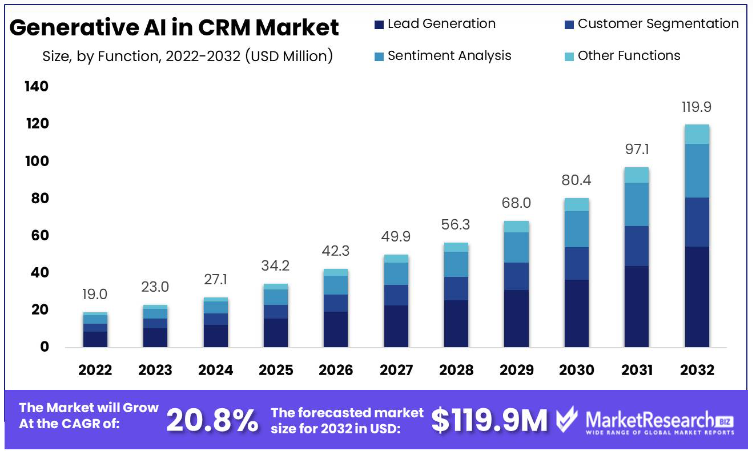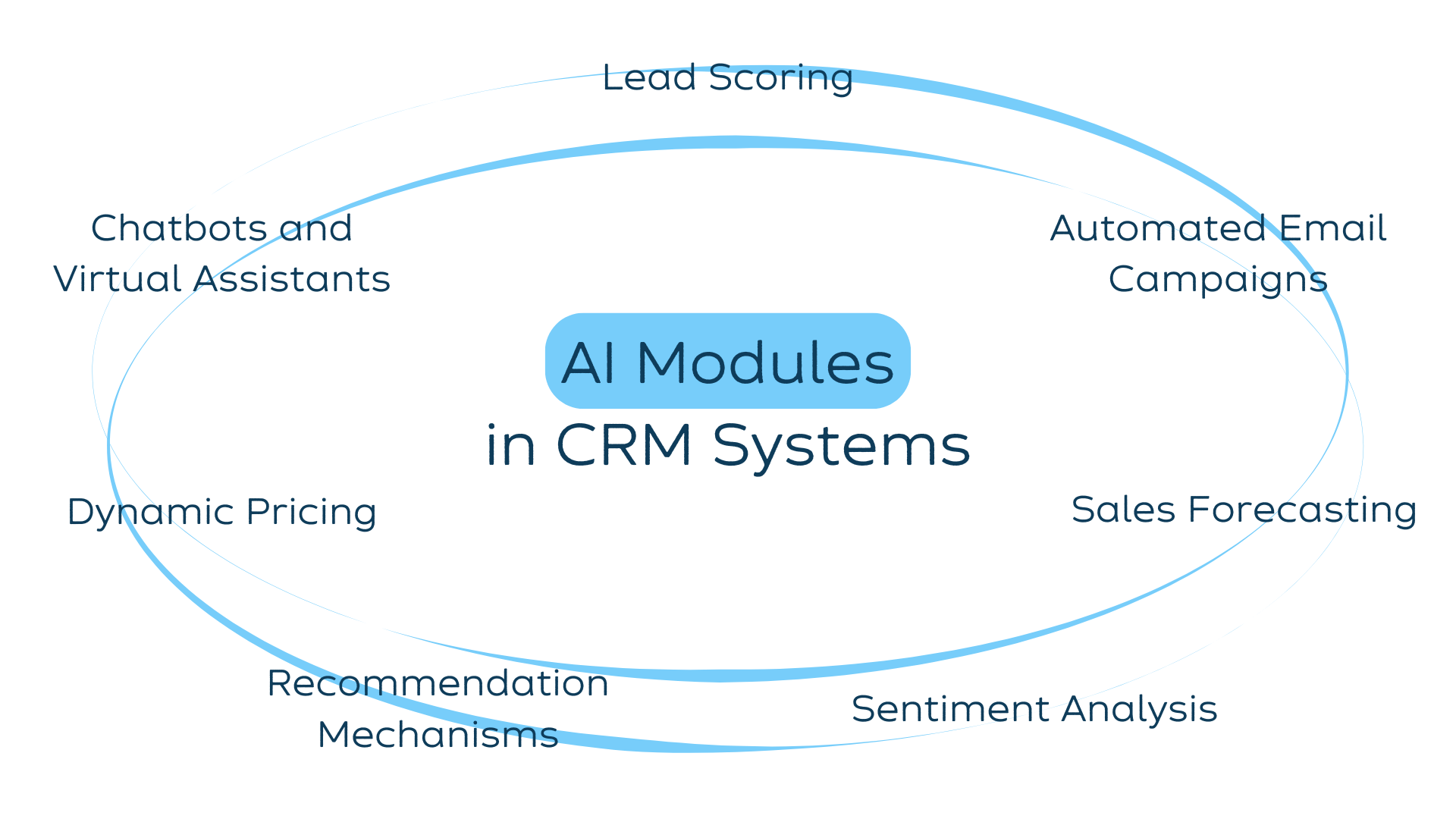Content
CRM systems have long become indispensable assistants for businesses and will maintain their stable position in the future. Data provided by Fortune Business Insights indicates that the customer relationship management market was valued at $64.41 billion in 2022. By 2030, this figure is forecasted to increase to $157.53 billion.
Within the last year, CRMs have seen significant enhancements with the widespread adoption of artificial intelligence. In particular, Market Research highlights the growth dynamics of using generative artificial intelligence (GenAI). According to this report, the generative AI for the CRM market is expected to demonstrate a CAGR of 20.8% over the next eight years. By 2032, it will grow to $119.9 million, whereas it was estimated at $19.0 million in 2022.

Source: MarketResearch
AdvantiSS experts explore the role of artificial intelligence in customer relationship management. We uncover AI modules integrated into CRMs to enhance their capabilities.
Artificial Intelligence Relation with CRM: Which Modules Will Help Optimize Your Business?
Various AI technologies, including generative AI (GenAI), machine learning (ML), natural language processing (NLP), and predictive analytics, are used to advance customer relationship management systems. These technologies help create individual program components known as modules. Customer service modules in CRM systems provide tools for communicating with customers, sales forecasting, data analysis, and much more.
Below, we present a list of AI modules in CRM software widely adopted within the last years.

Lead Scoring
CRM with AI uses algorithms to assess potential customers. It gives each lead a score, which demonstrates how likely they are to buy a product or service from you.
Along with basic information (demographics, income level, online activity, etc.), AI looks at how often the lead visits the website, what they click on, and if they’ve talked to salespeople before. Based on this, AI decides which leads are most promising.

These modules in CRM software have access to vast amounts of data, both collected from internal and open internet resources.
With this module, your sales can spot cold and warm leads. So that they can focus on who’s really interested in buying right away. And build strategies to convert those cold leads into warm ones.
Chatbots and Virtual Assistants
Even though AI-based chatbots and virtual assistants are widely used these days, more is coming. Business Research Insights shows a CAGR of 74.8% over the next seven years, surpassing the $888 billion mark by 2031.
NLP is one of the key technologies used in this artificial intelligence CRM module. It enables machines to recognize human speech and respond to user queries. Thanks to this peculiarity, intelligent chatbots can support both chat and phone interactions.

Here are examples of how NLP-powered bots and virtual assistants are used by businesses across different sectors:
- Amazon’s Alexa allows users to shop with voice commands, search for products, and track orders.
- Erica from Bank of America helps customers check balances, schedule payments, and get answers to common questions.
- KLM Royal Dutch Airlines’ chatbot assists with booking tickets and answering passenger queries.
Recommendation Mechanisms
AI-based CRM systems analyze consumer preferences, historical purchase data, and behavior patterns to create personalized recommendations. Given that about 75% of consumers worldwide expect enhanced service personalization, this is a must-have module for the CRM platform.
Personalized offers do a great job of increasing customer satisfaction. But they boost sales, too. For instance, Amazon attributes 35% of all company transactions to algorithmic product recommendations.
Netflix similarly employs recommendation algorithms. This streaming service recommends content to users based on genre, ratings, keywords, and more.

Dynamic Pricing
82% of shoppers compare prices before placing an order. Therefore, maintaining dynamic prices makes the company more competitive and attractive to buyers.
With AI-powered solutions, that’s pretty easy. Because of their inherent ability to rapidly process large volumes of information, AI-based customer service modules in CRM systems provide tools for real-time price optimization. AI analyzes competitors’ pricing policies and product demand. It may also consider customers’ reactions to previous discounts and promotional offers.
This in-depth analysis helps companies set competitive prices and seize market opportunities to maximize revenue. Amazon, Walmart, and Uber already use AI for dynamic pricing.

Sales Forecasting
AI-based CRM leverages predictive analytics to forecast future sales metrics. AI algorithms analyze historical sales data, customer interactions, and trends. Then, statistical models and machine learning techniques predict future sales events based on collected data. Accurate planning allows businesses to determine investment areas, manage resources, and plan strategically.
Deloitte experts look at another facet of sales forecasting through AI-based CRMs. They suggest leaders should build flexible sales and revenue forecasting systems. Particularly, the ones that can predict professionals’ effectiveness and connect disparate planning processes.

Automated Email Campaigns
A survey conducted in 2022 indicates that 32% of leading marketers worldwide use artificial intelligence for email personalization. Another research discovered that AI-supported email marketing turned out to be more effective than traditional approaches.
The integration of AI and CRM can streamline nearly any email marketing process. Mailchimp lists the following common uses:
- Customize content ideas for your brand
- Create different types of content (text and visuals)
- Review your existing email lists and compare metrics to rank different email addresses
- Optimize sending frequency by tracking the value of each email and the frequency of your efforts
- Analyze campaign success (measure what headings work better, which contact method is more useful, etc.)
- Remove low-quality and invalid email accounts
- Personalize emails based on the recipient’s interests, your goals, and past interactions
- Segment customers into different groups with similar behaviors, interests, or demographics
- Send customized and personalized emails automatically

Sentiment Analysis
Customer service quality is one of the most important factors for retaining customers. Statistics show that 61% of consumers will switch to competitors after a negative service experience with a company.
Artificial intelligence and CRM analyze interactions with the company’s consumers. Be it customer service inquiries or feedback acquired through email, social media, or website.
Powered by natural language processing and machine learning, AI algorithms scan feedback to tell if someone’s happy or frustrated from their tone of voice. This helps businesses:
- See who needs attention and help to deliver better customer care service
- Understand what customers like and dislike
- Personalize communication
KFC, Amazon, and Starbucks are already reaping the benefits of integrating sentiment analysis into their operations.







